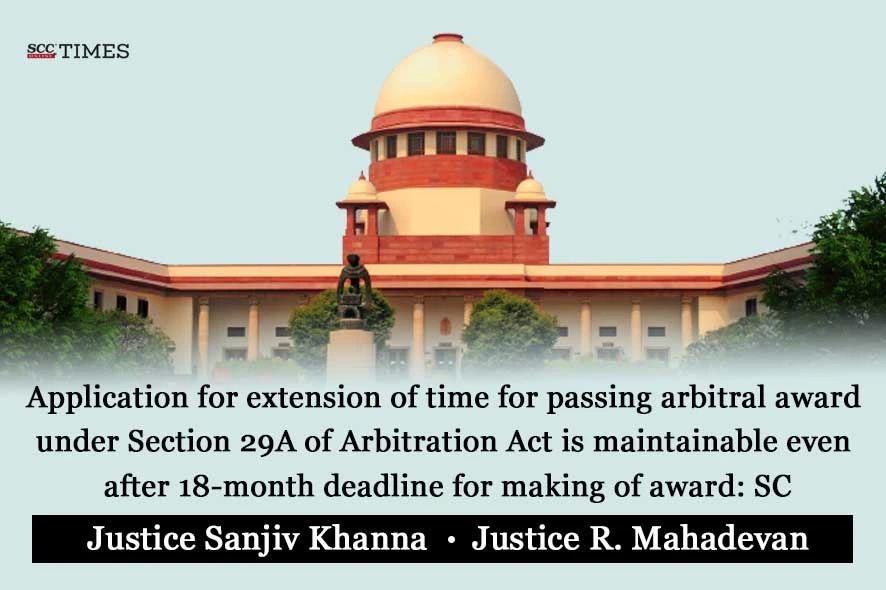Supreme Court: In a civil appeal against the judgment and order passed by the Calcutta High Court, wherein the Court held that the application for extension of time under Sections 29A (4) and 29A (5) of the Arbitration and Conciliation Act, 1996 (‘Act, 1996’) can only be entertained if filed before the expiry of the mandate of the arbitral tribunal, the division bench of Sanjiv Khanna* and R. Mahadevan, JJ. held that an application for extension of the time period for passing an arbitral award under Section 29A (4) read with Section 29A (5) is maintainable even after the expiry of the twelve-month or the extended six-month period. The court, while adjudicating such extension applications will be guided by the principle of sufficient cause.
Further, the Court clarified that such an extension is not granted mechanically on filing of the application, and terms and conditions can be imposed while granting an extension.
Issue: Whether an application for extension of time under Section 29A of the Arbitration and Conciliation Act, 1996 can be filed after the expiry of the period for making of the arbitral award?
Analysis and Decision:
After noting the views taken by various High Courts, the Court accepted the view taken by the High Courts of Delhi, Jammu and Kashmir and Ladakh, Bombay, Kerala, Madras, and the subsequent view expressed by the Calcutta High Court in Ashok Kumar Gupta v. M.D. Creations, 2024 SCC OnLine Cal 6909.
The Court examined Section 29A of the Act, 1996 and said that Section 29A (4) is the provision which requires interpretation. The Bench noted that where the award is not made within the specified period of twelve or eighteen months, the mandate of the arbitral tribunal will terminate. However, this provision does not apply if the Court has extended the period, either before or after the expiry of the initial or the extended term. Thus, Section 29A (4) empowers the Court to extend the period for making of the arbitral award beyond a period of twelve months or eighteen months, as the case may be.
The Court explained that the expression “either prior to or after the expiry of the period so specified” is unambiguous. It can be deduced by the language that the court can extend the time where an application is filed after the expiry of the period under sub section (1) or the extended period in terms of sub-section (3). The Court has the power to extend the period for making an award at any time before or after the mandated period.
After interpreting Sections 29A (5) and 29A (4), the Court said that the second proviso to Section 29A (4), by specific mandate, allows the arbitration proceedings to continue during the pendency of the extension application under Section 29A (5) before the Court. Further, the extension of time is to be granted by the Court only for ‘sufficient cause’ and on such terms and conditions as may be imposed by the Court.
The Court took note of the reasoning given by the High Court, that on the termination of the mandate, the arbitral tribunal becomes de jure incapable of performing its function. Thus, a party must file an application for an extension of time to make an arbitral award before the culmination of the initial twelve-month period or the extended six-month period.
The Court opined that the aforesaid reasoning is fallacious and unacceptable, as the word “terminate” in Section 29A(4) has to be read in the context of the said provision. The legislative preference for the term “terminate” over “suspend” is apparent, since the word “suspend” could cause incongruity and a legal conundrum if no party files an application for an extension of time.
The Court explained that the word “terminate” in Section 29A(4) makes the arbitral tribunal functus officio, but not in absolute terms. The true purport of the word “terminate” must be understood considering the syntax of the provision.
Interpreting the provision, the Court said that the absence of a full stop after the word “terminate” is noteworthy. The word “terminate” is followed by the connecting word “unless”, which qualifies the first part with the subsequent limb of the section, i.e. “unless the court has, either prior to or after the expiry of the period so specified, extended the period.” The expression “prior to or after the expiry of the period so specified” has to be understood with reference to the power of the court to grant an extension of time.
The Court remarked that Section 29A intends to ensure the timely completion of arbitral proceedings while allowing Courts the flexibility to grant extensions when warranted. Prescribing a limitation period, unless clearly stated in words or necessary, should not be accepted. Bar by limitation has penal and fatal consequences.
The Court opined that a restrictive interpretation of Section 29A would lead to rigour, impediments and complexities. A party would have to rush to the Court even when the period of arbitral mandate of twelve months has not expired, notwithstanding the possibility of a consent-based extension of six months under Section 29A(3). A narrow interpretation will be counterproductive.
The Bench also noted that under Section 29A(5), the power of the Court to extend the time is to be exercised only in cases where there is sufficient cause for such extension. Such extension is not granted mechanically on filing of the application. The court can impose terms and conditions while granting an extension.
Concluding the interpretation of Section 29 A, the Court said that, as per second proviso to Section 29A(4), the mandate of the arbitral tribunal continues where an application under sub-section (5) is pending. However, an application for extension of period of the arbitral tribunal is to be decided by the court in terms of sub-section (5), and sub-sections (6) to (8) may be invoked. The power to extend the time period for making of the award vests with the Court, and not with the arbitral tribunal. Therefore, the arbitral tribunal may not pronounce the award till an application under Section 29A(5) is sub-judice before the Court.
Thus, where an award is pronounced during the pendency of an application for extension of period of the arbitral tribunal, the Court must still decide the application under sub-section (5), and may even, where an award has been pronounced, invoke, when required and justified, sub-sections (6) to (8), or the first and third proviso to Section 29A(4) of the Act, 1996.
The Bench remarked “an interpretation which produces an unreasonable result is not to be imputed to a statute if there is some other equally possible construction which is acceptable, practical and pragmatic”.
Thus, the Court held that that an application for extension of the time period for passing an arbitral award under Section 29A(4) read with Section 29A(5) is maintainable even after the expiry of the twelve-month or the extended six-month period, as the case may be.
Also Read:
Supreme Court stays Calcutta HC order which restricted application filed under S.29A(4) of Arbitration Act after expiry of term of the Tribunal
CASE DETAILS
| Citation: 2024 SCC OnLine SC 2494 Appellants : Respondents : |
Advocates who appeared in this case For Petitioner(s): For Respondent(s): |
CORAM :









